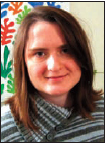by Tina Henne, Postdoctoral Program Coordinator
 I remember when I first met Sonja (named changed). She was a new graduate student in the Biological Sciences Department and I was assigned to be her “big sister” and help welcome her to Purdue. Shy and quiet by nature, she was just grateful to have been accepted to the program and wanted to do well. The first year of grad school was kind of hectic. It involved meeting new people, acclimating to a new environment and in many cases, a new culture, rotating through the labs of prospective advisors, teaching, all the while studying
I remember when I first met Sonja (named changed). She was a new graduate student in the Biological Sciences Department and I was assigned to be her “big sister” and help welcome her to Purdue. Shy and quiet by nature, she was just grateful to have been accepted to the program and wanted to do well. The first year of grad school was kind of hectic. It involved meeting new people, acclimating to a new environment and in many cases, a new culture, rotating through the labs of prospective advisors, teaching, all the while studying
for classes and the qualifying exam. It was a lot to manage.
While many big sister/little sister pairings dissolved naturally within a few weeks, Sonja and I kept in touch. She didn’t have much hands-on laboratory experience prior to grad school and would come to me for technical advice. There were some techniques with which I was not familiar, but I knew enough people to point her in the right direction and help her make the right connections. It wasn’t long before she was doing the same with the next cohort of graduate students. Beyond technical discussions and conversations centered on careers in microbiology, it was through this relationship that Sonja was introduced to college basketball and I learned about Indian culture. We were also known to partake in serious board game tournaments with a few other graduate students at a local coffee shop.
A few months ago, Sonja called to tell me that she successfully defended her dissertation. She also went on to thank me for being her “mentor” and for helping steer her through graduate school. Wow. I had not thought of myself in terms of her mentor. Not once did she ever come to me and ask me to be her mentor. All this time I thought I had just gained a good friend.
This can be quite the source of confusion, this word “mentor.” This is one theme that was prevalent among the attendees at the Elements of Effective Mentoring this past March. Some people might think that their supervisors are their sole mentors. While this is true in many cases, most people who are effective at networking, collaborating and navigating a new work environment will often have several mentors. You might not have asked someone to specifically be your mentor. Perhaps you wanted to “learn the ropes” of your new division or research group and sought the advice of a more experienced colleague. Maybe you needed to learn a new technique and shadowed a coworker or lab mate. It could also be that, having spent most of your adult life in a college or university setting, you wanted to learn more about other potential careers and asked a scientist or engineer about her or his career path. Maybe you had a new idea, but just didn’t know how to seek out potential collaborators.
There are many reasons and many benefits to having multiple mentors throughout one’s career. Many times, these relationships form naturally and organically—sometimes through informal conversations with colleagues and senior staff.
Sometimes, an initial mentor-mentee match up is beneficial. Take Sonja for example. While she went on to find mentorship through other colleagues and even to mentor back to incoming graduate students, I wonder if things had been different if she had not been assigned a “big sister.” Would she have known who to go to for advice? Would she have taken the initiative to seek out mentors on her own? As a smart woman and capable scientist, I am confident she would have found her way on her own. Given the gratitude she expressed upon earning her degree, I am humbled to know that I could help make that road a little less bumpy, helped saved her a little time and perhaps reduced her stress levels. And this is often the role that mentors take by helping mentees find their way, even temporarily. In a way, mentors are like enzymes—they lower the activation energy to make reactions proceed more efficiently and effectively.
Facilitated mentoring can be critical to a postdoc’s success, which is why the Postdoctoral Mentoring Program seeks to pair incoming postdocs with staff mentors in addition to their immediate supervisors. A postdoc’s job is temporary by design. They have to get on board, get trained, do sound research, and prepare for the next phase of their careers in a few, short years at most. There is a developmental component to these appointments that is just as important as doing good research. The postdocs of today face a tough and competitive job market. As a major contributor to Argonne’s success, we owe it to them to help them make their time here productive, efficient and enjoyable, while preparing them for a smooth transition to long-term employment. Mentoring is a key component to ensuring this success.
 Kristene “Tina” Henne (CEPA) is the Postdoctoral Program Coordinator. She came to Argonne as a postdoctoral appointee in the Biosciences Division in 2009. Her research in the Protein Mapping Group focused on the proteomic response of Anaeromyxobacter dehalogenans to metals. While a postdoc, she was active in the Postdoctoral Society of Argonne, volunteered for events such as the Middle School Science Bowl, SCSW, IGED and the AABC Science Education and Cultural Arts Day.
Kristene “Tina” Henne (CEPA) is the Postdoctoral Program Coordinator. She came to Argonne as a postdoctoral appointee in the Biosciences Division in 2009. Her research in the Protein Mapping Group focused on the proteomic response of Anaeromyxobacter dehalogenans to metals. While a postdoc, she was active in the Postdoctoral Society of Argonne, volunteered for events such as the Middle School Science Bowl, SCSW, IGED and the AABC Science Education and Cultural Arts Day.
She also mentored a summer undergraduate student intern. She received her Ph.D. in Biological Sciences, with an emphasis on Microbiology and Molecular Genetics in January 2008 at Purdue University, performing half of her dissertation work as a Guest Graduate Researcher at Argonne.

